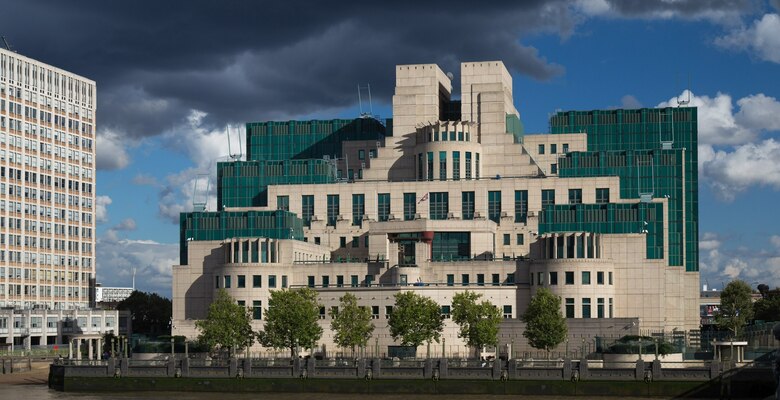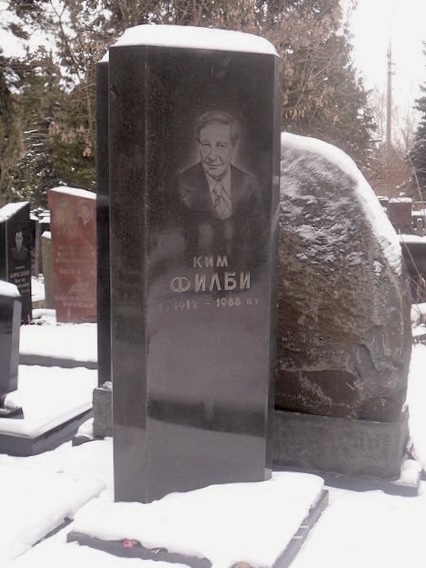
In November of this year, the British intelligence services announced an easing of their hiring rules; the requirement that new recruits must have at least one parent who is a British citizen has been lifted. The military expert Sergei Migdal, a former Israeli police officer who worked for many years with the British security services, has talked to Kommersant UK about the possible reasons for this move and given us an overview of the British security services.

Sergei, how did you get to see how the security services in Britain work?
Quite easily; for 15 years, I was an Israeli civil servant and police officer. We worked very closely with the British counter-terrorism services, in both Britain and Israel. For example, the British services helped us when Islamist terrorist organisations took advantage of UK citizens’ visa-free access to Israel to recruit extremists in England to commit terrorist attacks in our country. One of these attacks led to casualties, but we managed to prevent several others; we caught the terrorists in transit, in the preparation phase. Equally, we helped the English to work against terrorist organisations in the Middle East. Overall, Israel and Britain exchanged information and assisted each other successfully. The Israeli intelligence services were born, lived and developed in conditions of extreme stress, a constant threat and hard work, which is why they have achieved high standards, a reputation for excellence and world recognition. This is why Israeli security services are constantly exchanging information with the intelligence forces of different countries. After Al-Qaeda’s large-scale terrorist attacks at the end of the 1990s and the beginning of the 2000s, intelligence services all over the world, including in Britain, hurried to Israel to learn how to fight terrorism, as, beginning in the 1960s, it became the first country in the world to be a target for international terrorism. I have now been living in London for a long time. I know many people who work in this field and I know the situation inside out.
How is the work of the British security services organised?
The renowned MI5 service is responsible for domestic security (counter-intelligence). Their headquarters are in Millbank, on the banks of the Thames. Initially, this was a classic counterintelligence agency, the main task of which was to catch foreign spies, whilst at the same time, it fought political extremism. This was over 100 years ago, at the start of the 20th century, when Irish Republican and leftwing extremists posed the main threat, organising a series of terrorist attacks in a range of European countries, including England. Over time, to this list was added the struggle against Islamic terrorism and the sporadic threat from members of generally marginal far-right organisations. They are the ones who perpetrate attacks in mosques and against the Muslim and Jewish communities. One of these killed MP Jo Cox several years ago. The foreign intelligence service is MI6, which also has the pretty name of Secret Intelligence Service or SIS. They conduct special operations overseas.
How does the British approach to security differ from the Israeli way of doing things?
Here, the police have to help the security services, but the English police service is, let’s say, a little peculiar. In Britain (and in the US, incidentally), unlike Israel, there is no unified police force. Each large city or county has its own force. In London, it’s the Metropolitan London Police at Scotland Yard, in York, it’s the Yorkshire Police Force, in Northern Ireland, it’s the Northern Irish Police Force. This complicated system makes security questions more difficult as interactions between the various forces are often poorly coordinated. For instance, there was a case of a terrorist attack in a provincial British town during which the local police were found to be helpless when faced with strapping Islamist terrorist armed with a machete. When this happens, you can generally rely on the special forces, who’ll fly out from London in a helicopter, or on reinforcements of armed police arriving from another, larger, town. The police service is one of the weaker components of the British security and counter-terrorism apparatus. It’s strongest of all in London, where there is a special department; Special Branch, they’re armed and able to repulse any terrorist.
There have been no large-scale terrorist attacks in Britain in recent years. Can we say that the British services are doing a good job?
Overall, especially after the wave of terror orchestrated by the Irish Republican Army in the 1970s and the Islamist terror that began in the 2000s, I’d say that the British security services have raised their game, it’s really not bad. Terrorist attacks themselves come in waves. We can cite statistics; for instance, the last significant wave was during the premiership of Theresa May. Despite her reputation as a tough lady, during her time in office there was a whole series of attacks; in parliament, on London Bridge and in several other places. But this was not connected to events in England alone; these incidents were a result of the rise of the Islamic State, which had significant numbers of followers, including British residents. Many of these had left the UK with the express purpose of joining the Islamic State and fighting on its side in Syria or Iraq. They went there via Turkey. At that time, 2016–2018, there was a war going on against ISIS in which Britain was participating. Now, however, this topic has completely disappeared. Coronavirus has dealt a special blow to terrorism…
How so?
Just as a fire needs oxygen to burn, terrorism needs the attention of the media. The greater the media coverage, the happier the terrorists are, and the more young extremists and slightly unbalanced people want to join them. They want to see either themselves or the results of their actions on television. And when this news is forgotten and crowded out by another story (such as the Coronavirus) then, no matter how much you wave a machete, they’ll only write about you on page 12.
Does this mean that if an attack is unlikely to be on the front page or get live coverage, they just won’t do it? By this logic, does it follow that, no matter how cynical it sounds, we’re currently being protected by the dominance of another story in the news agenda; the war in Ukraine?
As I have already said, an important factor keeping terrorism on the boil is its coverage in the media. The more hysterically this is done, the better. This is also true about Ukraine, this topic gets a great deal of attention. People’s attention is limited, and it’s not realistic to take an interest in absolutely everything, which is why, when one exceptionally important story is dominating the news, all the other stories tend to recede into the background. But it’s not just Ukraine ruling the headlines; there is also the struggle to protect the environment, the chaos in the British government, as well as the strikes. Another factor is the defeat of the Islamic State in Syria and Iraq. This has reduced potential terrorists’ motivation to organise new terrorist attacks and has made ISIS less attractive to new recruits. And the fewer new recruits are drawn in, the fewer attacks can occur. It goes without saying that you have to take into account that a proportion of these terrorists would still be here anyway and that there will always be some terrorists, but as a rule, they are caught before they can do anything. This is a daily task of the police and security services.
If the danger of Islamic terrorism has still not fully disappeared but has significantly fallen, what can be said about other threats, such as cyberattacks?
Cyberattacks are very convenient; it’s easy to imagine that they are done by unknown persons and they can be blamed on nameless hackers… but someone is always behind them, it’s not just computers going mad. And it’s not just Vasya and Misha the hackers, but something much more professional, for instance, the agents of one or another hostile state. I’m not just talking about the Russians; in England, China and its hackers, for example, are also considered a great threat. In China, cyberattacks are organised at a state level; there are special departments dedicated to the theft of scientific secrets. It’s no surprise that the English have spent so much time building alliances in the Pacific, with Australia, New Zealand and Japan.
By the way, Russian hackers are considered some of the best in the world. Why do you think that is?
Several factors can explain this. Firstly, Russia has nurtured future young hackers since the start of the 2000s. Instead of putting them in prison, the security services pressured them to enter their tutelage. As the FSB had been operating in Russia since the 1990s, this was often in the form of public-private partnerships, where these kids worked as private individuals, whilst, at the same time, helping the FSB with certain tasks. On the other hand, what actually is a hacker? They’re just a type of software developers. In Russia, Ukraine and Belarus, there have always been a lot of people who were excellent IT developers. Some of these are very good hackers. In Soviet times, mathematics was taught very well, especially compared to the teaching of maths, physics and other disciplines in the west. This meant there was a talent pool out of which they could draw candidates for this work, especially when you consider the size of the country.
Is it difficult to get hired by the MI6 security service?
It’s now got a lot easier to get your foot in the door; MI6 often recruits through advertising, and, anyway, you could just send them your CV, but there was a time when the hiring process happened quite differently. It used to be roughly the same in Britain as in Israel; they approached a person, they watched them from a very young age, and only after that did they make a recommendation. It only used to be possible to get into the service through family connections, especially in aristocratic circles, in the spirit of ‘bringing friends or relatives’. After the second world war, many veterans of special forces units came to work in the security services, as the work was familiar to them. These were people who were used to working in conditions of stress and uncertainty. But since then everything has changed, the organisations have grown and become huge. Smart analysts, IT specialists and many others are now in demand. I know of cases where people were recruited at Oxford and at various technical facilities.
So why are they recruiting through advertising now?
This is due to the greater freedom of information. Even the London location of MI6 headquarters used to be secret, as well as the identity of the head of the service, but now this information is open access. 20 years ago this wasn’t allowed, they still referred to the chief of MI6 simply as M. Their real name was only disclosed on a need-to-know basis.
How secret is the recruitment process?
At first, the candidate is asked to sign a non-disclosure agreement. People who work in the British secret services can’t talk about it to their friends, a cover story is created for each of them. Only one person can know their real place of work. This could be a husband or wife. They must be checked. Not just a criminal record check (a DBS), but a more thorough procedure which can take many months. Security officers can even go privately to friends and relatives of the candidate under various pretexts and try to find out as much information as possible to identify any suspicious or criminal links. Later, when the person is in operative service, every year they have to undergo testing with a lie detector. They check everything, even if they have been stopped for speeding.
Would a speeding ticket be grounds for the British intelligence service to turn down a candidate?
A single fine wouldn’t be grounds for concern, but if it was noticed that the candidate had many fines for speeding or running red lights that would demonstrate problems of character and behaviour. Nowadays they can openly say that they smoked weed at college, which used to be a fatal admission for candidates.
What usually happens if people are dismissed from the security services?
After being sacked, they give them a heap of papers telling them what they can and can’t do. What this means is that if an ex-spy wants to write a memoir or a book, they are strictly forbidden from publishing anything until the text has gone through the censors, and then the publication should be confirmed by a special commission at the Prime Minister’s office. A good example is Stella Rimington, the former general director of MI5. She wrote a memoir about her life and work in the house of lords. Negotiations over these memoirs went on for about six months. That was how long it took to agree on the text and make various amendments. Only after that was it possible to publish the book.
MI6 has recently been recruiting staff with knowledge of Russian more and more often. What’s the reason for this?
Here’s the thing. One reason why there were so many attacks on the tube and on buses in 2005 was, as it turned out, because counter-intelligence had been focused on Irish terrorism for many years, and questions related to the Arab world had been pushed into a forgotten corner. Only after the Al Qaeda terrorist attacks in America in 2001 did they finally begin to pay attention to this part of the world. But this takes a lot of time; they had to recruit specialists, analysts and operatives who knew Arabic, Urdu, Pashto and other languages. This can’t be done in one day, it takes many years of complex work on which a huge budget was spent. MI6 began to recruit people from oriental languages faculties, as well as those whose parents had emigrated from India, Pakistan, Africa and the Near East. Almost 95% of their resources were spent on this. Now, after 2014, (the annexation of Crimea) a crisis in relations with Russia began, and it turned out that there were very few people who understood what was happening there; the secret services did not have enough specialists who knew Russian. This is because over the last 20 years all resources have been put into those who speak Arabic or Pashto. Now, due to recent events, this pivot to Russia has strengthened further, which is why recruiting staff with knowledge of Russian has become very urgent. People who understand the language, mindset, and customs of the enemy are needed; without them, it’s impossible to make sense of secret communications. Even if an English person has studied Russian, this is still not enough to completely understand the environment in Russia and the local mentality.
Previously, one of the main conditions for work in MI6 was to have British citizenship, and at least one British parent. But recently we’ve heard the news that they have simplified these rules; now having a parent who is a British citizen is no longer a requirement…
As I have been saying, they need people who have knowledge of the language and mentality of the potential enemy from real life, rather than just from books. This is like the old Jewish joke; ‘do you need a taxi sign or a ride?’*. It is precisely due to these factors that the Israeli special forces are so successful; we have recruits from dozens of countries! They are an integrated part of society, and not inhabitants of isolated immigrant ghettos, like in some countries of Europe. Stricter rules greatly reduce access to the talent pool. In a word, the members of the renowned Cambridge Five spy ring, headed by Kim Philby, were all English and from upper-class backgrounds, yet they turned out to be Soviet agents. So, in any case, everyone has to be checked, without exceptions.
Overall, how attractive is a post at MI6?
It’s interesting and absorbing work. However, during crises, you have to sleep at your desk…Do you remember when, in the film Ronin, one of the main characters pronounced the phrase ‘It’s important for a man to spend at least a part of his life serving something bigger and more important than himself’? The intelligence service isn’t hotel management or commerce, it’s something bigger. It’s true that this is harder to explain to people who have grown up in Russia.
What could constitute cause for the security services to take an interest in you? And how do they act when they do?
There may be clear grounds, such as a provocative public act; going out with a poster, inciting intercommunal strife, or calling for violence. In these cases, for example, for racist insults, a criminal case may be initiated. People who work in the public sector may be fired (recently this happened to several policemen in London). There are also complex cases when there are suspicious persons for whom surveillance is arranged. For example, information may have been received, based on rumour, saying that radical islamists are meeting in such and such a mosque. The security services infiltrate the location with an agent who looks just the same as, let’s say, the Pakistanis who go to the mosque. Let’s call this agent Faisal. He starts up friendships with other members of the congregation, finds out that the most active of them is Mohamed, and then overhears this Mohamed saying that he’s going to buy some explosives… in the evening after the regular meeting, this so-called Faisal goes and writes a report about everything he has found out, and passed the information to an operations officer. But here we come to the main problem; the need to analyse a huge amount of information and throw out what is unnecessary while paying attention to certain individuals. Often, they just don’t manage to do it in time. Many terrorists who have committed attacks in recent years, were already on the security services’ watch lists. There had been complaints about these people, they’d even been under surveillance, but then it was decided that they weren’t a priority and so they were forgotten about. There isn’t enough time or resources to watch everyone, as to organise surveillance of one suspicious individual, dozens of officers and a great deal of money are required. Now we have the internet and social media where people talk, as well as the darknet. The secret services watch these as well. If an ordinary person can go there, then it’s even easier for the security services, as they have a wide arsenal of tools at their disposal.
Has the internet simplified the work of security services?
It’s become both simpler and more complex at the same time. The internet is a tool which helps to nip some nascent plans in the bud. It also makes it easier to find people, especially if they aren’t professionals. Amateurs are sometimes careless and often don’t especially try to hide. On the other hand, the internet suits terrorists and extremists well as a means of forming networks across vast distances without the need to meet in person. They can organise their actions remotely, which used to be hard to do. Now you can open an anonymous Gmail account and correspond with acquaintances in a special private regime, immediately wiping your messages after they are received.
What messenger is considered the most suitable for confidential discussions?
Signal is held to be the messenger with the highest degree of protection, it’s more secure than WhatsApp which is much easier to intercept and decode. But in any case, half-jokingly, half seriously, my advice to people who want to have a private discussion with someone and ensure that no one overhears is always the same; to go to the sauna together. If you’re completely naked, then it’s clear that you have no listening devices, and it’s impossible to eavesdrop in the steam room anyway, it’s too noisy and microphones don’t work because of the humidity…
* A man is trying to hail a taxi by the side of the road. A car stops and the man asks the driver how much he wants to take him to the airport. The driver names his price, and the man asks suspiciously:
‘Are you really a taxi?’
‘I might be’
‘But where’s your taxi sign?’
‘Make your mind up, do you need a taxi sign or a ride?’ [Editor’s note]








